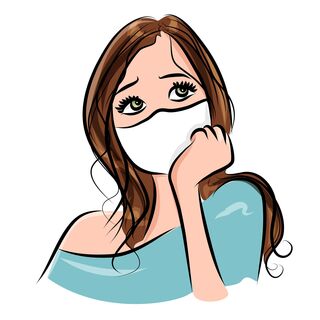Coronavirus Disease 2019
Is COVID-19 Driving You Crazy?
New research shows why we're so stressed about the pandemic and mental health.
Posted August 13, 2020

All across America, worry and stress about the coronavirus pandemic are increasing. According to the KFF Health Tracking Poll by the Keiser Family Foundation published on July 27, 2020, 53% of adults in the U.S. worry that stress about the coronavirus pandemic is negatively affecting their mental health. This number is higher than the 39% who responded in May 2020 (KFF Tracking Poll, 2020).
The KFF Health Tracking Poll was conducted July 14-19, 2020 among a random telephone sample of 1,313 adults in the U.S. Here are some major concerns:
- Most adults in the U.S. feel the worst impact of the coronavirus pandemic has not yet occurred.
- 4 out of 10 respondents report difficulty affording their basic necessities or falling behind paying medical or household expenses during the past three months.
- 63% of respondents think opening schools later to reduce the risk of getting coronavirus is a better option, even if some students will miss out on services or academics, or some parents may be unable to return to work.
- Younger adults, rather than older adults, are more likely to report that the coronavirus is having a negative impact on their mental health, as they struggle to deal with child care, work challenges, children falling behind academically, and worries about their family finances.
- About 1 in 3 (36%) respondents report that worry or stress related to the pandemic is leading to difficulties with sleep, and 32% connect the pandemic to poor appetite or over-eating.
Clearly, many Americans are suffering during this time of challenge and adversity. Here are a few tactics to help you cope:
1. Get accurate information, knowledge, and preparation to help reduce feelings of stress and overwhelm. Joseph McGuire, Ph.D., a psychologist at Johns Hopkins Medicine (2020), recommends seeking solid up-to-date information from credible resources about the illness, the science, and steps you can take to prevent it. He cites the World Health Organization and the Centers for Disease Prevention (CDC).
2. Have conversations with your kids. Dr. McGuire (2020) also recommends a few tips to help children feel calmer: Listen carefully to your child’s concerns. “After hearing their children out, parents can fill them in with correct information to calm their worries” (McGuire, 2020). Share accurate information and practical solutions to reduce your child’s risk. Focus conversations on actions kids can do, such as healthy hand-washing and healthy routines for playing.
3. Take good care of Your body. The Centers for Disease Control (2020) offers recommendations for coping with stress, including:
- Get a good night’s sleep.
- Eat healthy meals that are well balanced.
- Stretch, take deep breaths, or meditate.
- Exercise regularly.
- Give yourself time to do activities that you enjoy and help you unwind.
4. Remember the importance of relationships. Connect with other people. Talk with people. Ask them how they are doing and share your own concerns.
This post is for educational purposes and should not substitute for psychotherapy with a qualified professional.
References
Hamel, L., Kearney, A., Kirzinger, A., Lopes, L., Munana, C., & Brodie, M. (July 27, 2020). KFF (Keiser Family Foundation) Health Tracking Poll – July 2020. https://www.kff.org/coronavirus-covid-19/report/kff-health-tracking-poll-july-2020/
Your Health: Coping with Stress. Centers for Disease Control and Prevention. July 1, 2020. https://www.cdc.gov/coronavirus/2019-ncov/daily-life-coping/managing-stress-anxiety.html
McGuire, J.M (2020). Stressed about Covid-19. The Johns Hopkins University, The Johns Hopkins Hospital, The Johns Hopkins Health System. https://www.hopkinsmedicine.org/health/conditions-and-diseases/coronavirus/stressed-about-covid19-heres-what-can-help


